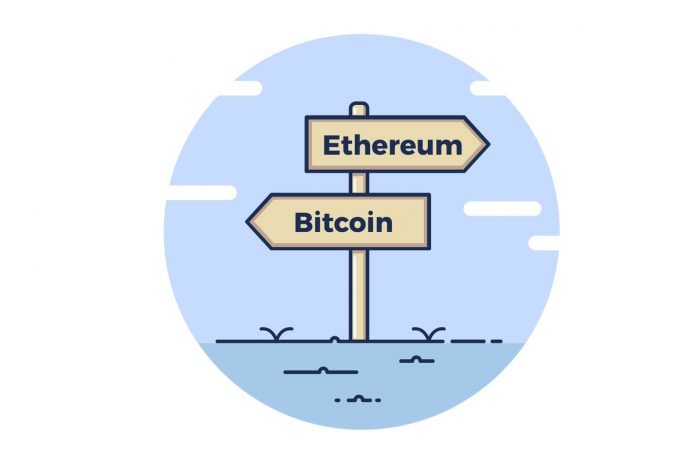
Bitcoin and Ethereum are at the forefront of the cryptocurrency world. Both are robust and valuable currencies. Each doing things differently from the other, and both with some great advantages as well as disadvantages. In this article, we explore the pros and cons of Bitcoin and Ethereum, which will allow you to make up your mind about which one is best for you to buy.
Bitcoin
The seasoned veteran, Bitcoin is the original crypto token. Since its introduction, it has garnered much interest and risen in the BTC to USD value significantly. Bitcoin operates using blockchain technology, which is a virtual ledger that is used to record transactions. Each transaction forms a block on the chain, over time the chain grows as more transactions are processed and more blocks are added.
Pros of Bitcoin
Here are the advantages of Bitcoin:
Fame
Bitcoin is by far the most famous crypto; in fact, it is even well known outside of the crypto sphere. With plenty of media coverage and lots of attention paid to the Bitcoin success stories, Bitcoin enjoys a level of fame that other cryptos can only dream of. This fame is crucial now to Bitcoin’s further success. As investor confidence sometimes drops, the fame of Bitcoin is attracting new investors to the crypto world, and for every seasoned investor that switches to an altcoin there are a number of amateur investors looking to fill in the gap.
Blockchain
Blockchain that Bitcoin operates on is a great bit of tech. It has lots of transferable real-world applications and has been used in medical and accounting fields to store and protect data. Because there is value in the currency’s core technology, it will ensure that Bitcoin has value for years to come.
Security
Bitcoin tokens can’t be counterfeited and transactions are secure, without the option for the payment to be reversed. This gives Bitcoin users a tremendous security advantage over other forms of digital money and many real-world currencies.
Cons of Bitcoin
There are lots of advantages to buying Bitcoin, but, there are also a few drawbacks. Here they are:
Transaction Times
Something that has plagued Bitcoin since its inception is its dismal transaction times. With blocks sometimes taking up to 10 minutes to process, it can be incredibly time-consuming to complete a purchase. Many altcoins have taken advantage of this and created faster transaction models for their currencies to run on.
Mining
It is now nearly impossible to mine Bitcoin unless you have incredibly sophisticated computer equipment. This means that new users have to invest in rather than mine the coin, like was commonplace in the old days. As Bitcoin nears its supply limit, it is going to become increasingly difficult for even the most powerful computers to mine.
Ethereum
Ethereum is the second largest crypto by market value and is a fantastic alternative to Bitcoin. It addresses the transaction speed issues and has a large following of investors, traders and users. Like Bitcoin, it uses blockchain technology and has experienced tremendous surges in value. In 2017 alone, the currency rose by around 13,000%. It uses smart contracts to process information. Ethereum is the platform while Ether is the token that is used on that platform.
Pros of Ether
Here are the great things to consider before deciding to purchase Ether:
Smart Contracts
Smart contracts are designed to streamline the transaction process. When parameters have been met, the smart contract is automatically triggered to process the transaction in an expedient manner. This creates a flowing and easy to use transaction system that Bitcoin currently lacks.
Ethereum Blockchain
Ethereum has a dedicated and innovative team working on creating business-friendly platforms on which to operate. With Ethereum’s blockchain being largely accessible, companies can easily bolt onto the existing blockchain and use it for their own purposes. This usability means that Ether gains momentum and value as more businesses begin to use the Ethereum blockchain.
Growth
As with Bitcoin, there is real potential for Ether to grow in value over time. Whether or not this is immediate or further down the line remains to be seen, but historically, Ether has always weathered any downturns and faired well in a very competitive marketplace. This should provide reassurance to any potential Ether buyers.
Cons of Ether
There are a few bad aspects that should be mentioned about Ethereum, here they are:
Centralized Currency
Ethereum has a base of operations and the currency doesn’t enjoy the freedoms of other crypto that is decentralized. If the Ethereum blockchain goes down at any time, then the users of the platform lose the ability to use Ethereum and any smart contracts a customer holds may be lost in the process. This is a fundamental flaw in an otherwise great platform.
Gas Fees
To complete transactions on the Ethereum platform you will need to use something called gas. These fees are often minimal, but if you’re a company using the Ethereum platform to transact, these can add up to quite substantial amounts of money. Especially if you have many clients making payments through the Ethereum platform.
Ethereum is More Exposed to Competition
Whilst Bitcoin has the rivalry of every altcoin on the market, it benefits from not needing to worry too much about competitive activity because it draws in new users regularly. Ethereum, on the other hand, has very heavy competition and has no real way of drawing in new users in the same way as Bitcoin. This means that if an altcoin gains traction on Ether, then the value of Ether could drop considerably. While the Ethereum development team are always working away to ensure this does not happen, there is no guarantee that it won’t.
Hopefully, this article has given you a lot of useful information about Bitcoin and Ethereum (Ether) and will allow you to make an informed decision about which currency is best for you to purchase.










thank you for the informative post